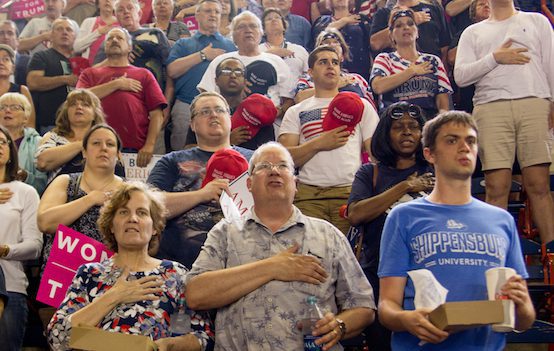The Biggest Losers of Trump’s Presidency: His Voters

The saddest victims of Donald Trump’s 2016 presidential victory, it now seems clear, are going to be his voters. The greatest beneficiaries of that election are going to be his haters.
This political paradox stems from the seeming inevitability of this president leaving his constituency high and dry through political incompetence, behavioral incontinence, an inability to maintain a focus on anything, and an incapacity to think or act coherently. His presidency so far has been characterized by political failure, and it’s going to get worse before the end of his term, by which point the voters will have expelled him from the White House.
That will be bad news for those who voted for Trump in 2016. They correctly saw in him an unconventional politician willing to talk about national problems that the country’s ruling classes wanted to ignore or finesse. Trump put forth a distinct political outlook that couldn’t be found anywhere else within either party (although Bernie Sanders also offered an unconventional narrative of the American plight).
Trump’s great political feat was that he opened up a new fault line in politics: the elites of the coasts versus the heartland masses; the globalist upper crust versus the nationalist middle; anti-working class liberalism versus conservative populism. In truth, this fault line was already there, roiling American politics just beneath the surface. But Trump had the instincts to see what just about everyone else missed—that these subterranean angers could be pulled up and harnessed into an electoral coalition that could win the White House.
The operative word here is “instincts,” for it was clear that Trump operated only on the surface of things. He lacked the thinking skills and even the vocabulary to go any deeper. But it is below the surface where the great political battles are waged. That’s where coherent arguments and narratives are pieced together. It’s where politicians craft the language they need to communicate effectively with the people. It’s where coalitions are galvanized.
Trump can’t get there. That’s one reason he repeats himself so often. After making a bold statement, other politicians elaborate on it, hold it up to the light for illumination, offer explanatory language, parse the complexities. Trump can’t do that, so he merely says the same thing over and over again. That contributes also to the ham-handed way he deals with political and diplomatic challenges, even highly delicate ones.
But it takes more sophistication than that to build a governing coalition—a body of favorable sentiment from various population segments that forces other politicians to take notice and tread carefully in opposition. Trump’s approval ratings, based on composite calculations by the FiveThirtyEight and Real Clear Politics websites, remains stuck around 42 to 44 percent, far below what history tells us is necessary for reelection.
Fred Barnes, writing in The Weekly Standard, correctly notes that the midterm elections demonstrated that Trump “has real-life reelection trouble.” He adds that millions of voters expressed their disdain for Trump in the congressional balloting, brushing aside the president’s achievements on taxes, judges, and deregulation. This showed “how strongly they felt about his personal behavior.” Worse, says Barnes, Trump doesn’t appear to understand this, as reflected in his suggestion that defeated Republican House members could have survived had they more avidly accepted his “embrace.”
Barnes hypothesizes that there’s still time for a Trump recovery. The idea that he can’t change, says the conservative commentator, is “ridiculous.” Perhaps. But there’s also no evidence that he wants to change in significant ways or that he could even if he wanted to.
And so the die is probably cast. Trump will be a one-term president. The Democratic Party will take over.
The result will be ever-greater frustration on the part of those who voted for Trump—nearly 63 million Americans—because he dared to herald border security as a paramount national imperative, to press for trade “reciprocity” in the interest of the working class, to assault the American foreign policy establishment, to question the prevailing (inherently unstable) global order, to advocate tax reductions and deregulation, and to embrace judicial conservatism.
All that will be reversed or undone under the succeeding Democratic presidency. In the meantime, Trump himself has already reversed his campaign stance regarding the country’s foreign policy, having installed Mike Pompeo as secretary of state and John Bolton as national security adviser—men who personify the prevailing establishment outlook of hegemonic liberalism.
Thus, because of Trump’s political and leadership shortcomings, Trump voters will see their hopes of a new direction for America trampled and thwarted.
Resurgent Democrats naturally will do all they can to stamp out Trumpism—on immigration policy, taxes, trade, regulation, global thinking, and much else. The party is lurching towards a tight embrace of European-style democratic socialism and doubling down on identity politics. It evinces no apparent interest in a rapprochement with the working class. It seems increasingly comfortable as the party of racial minorities, immigrants, Millennials, highly-educated whites—and, as political analyst Ron Brownstein put it about Barack Obama’s 2012 strategy, “just enough blue-collar Midwestern whites to put the president over the top.”
Hillary Clinton, unlike Barack Obama, didn’t get “just enough” of those blue-collar Midwestern whites to capture the presidency in 2016. That’s because Donald Trump brilliantly pulled them under the GOP banner. But Trump’s inability to forge a governing coalition and his ongoing uncouth behavior have accreted his constituency, as manifest in those persistently lackluster approval numbers. The result is that those Trump voters hoping for a new direction won’t get it from this president. He is in the process of letting them down. The eventual winners will be the anti-Trump Democrats.
Robert W. Merry, longtime Washington journalist and publishing executive, is the author most recently of President McKinley: Architect of the American Century.